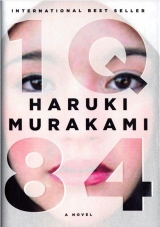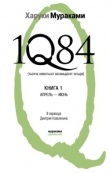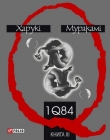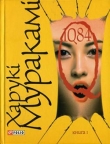
Текст книги "1q84"
Автор книги: Haruki Murakami
Жанр:
Современная проза
сообщить о нарушении
Текущая страница: 20 (всего у книги 81 страниц)
“Another case of a violent husband?”
“Not at all,” the dowager said drily. “She’s only ten years old.”
The dowager and Aomame cut through the garden and, unlocking a small gate, entered the adjoining yard. The safe house was a small, wood-frame apartment building. It had been used in the old days as a residence for some of the many servants who had worked for the dowager’s family. A two-story structure, the house itself had a certain old-fashioned charm, but it was too age worn to rent out. As a temporary refuge for women who had nowhere else to go, however, it was perfectly adequate. An old oak tree spread out its branches as if to protect the building, and the front door contained a lovely panel of ornamental glass. There were ten apartments altogether, all full at times but nearly empty at other times. Usually five or six women lived there quietly. Lights shone in the windows of roughly half the rooms now. The place was oddly hushed except for the occasional sounds of small children’s voices. The building itself almost appeared to be holding its breath. It lacked the normal range of sounds associated with everyday life. Bun, the female German shepherd, was chained near the front gate. Whenever people approached, she would let out a low growl and then a few barks. The dog had been trained—how or by whom it was not clear—to bark fiercely whenever a man approached, though the person she trusted most was Tamaru.
The dog stopped barking as soon as the dowager drew near. She wagged her tail and snorted happily. The dowager bent down and patted her on the head a few times. Aomame scratched her behind the ears. The dog seemed to remember Aomame. She was a smart dog. For some reason, she liked to eat raw spinach. The dowager opened the front door with a key.
“One of the women here is looking after the girl,” the dowager said to Aomame. “I’ve asked her to live in the same apartment and try not to take her eyes off her. It’s still too soon to leave her alone.”
The women of the safe house looked after each other on a daily basis and were implicitly encouraged to tell each other stories of what they had been through, to share their pain. Those who had been there for a while would give the newcomers tips on how to live in the house, passing along necessities. The women would generally take turns doing the cooking and cleaning, but there were of course some who wanted only to keep to themselves and not talk about their experiences, and their desire for privacy and silence was respected. The majority of women, however, wanted to talk and interact with other women who had been through similar trials. Aside from prohibitions against drinking, smoking, and the presence of unauthorized individuals, the house had few restrictions.
The building had one phone and one television set, both of which were kept in the common room next to the front door. Here there was also an old living room set and a dining table. Most of the women apparently spent the better part of each day in this room. The television was rarely switched on, and even when it was, the volume was kept at a barely audible level. The women preferred to read books or newspapers, knit, or engage in hushed tête-à-têtes. Some spent the day drawing pictures. It was a strange space, its light dull and stagnant, as if in a transient place somewhere between the real world and the world after death. The light was always the same here, on sunny or cloudy days, in daytime or nighttime. Aomame always felt out of place in this room, like an insensitive intruder. It was like a club that demanded special qualifications for membership. The loneliness of these women was different in origin from the loneliness that Aomame felt.
The three women in the common room stood up when the dowager walked in. Aomame could see at a glance that they had profound respect for the dowager. The dowager urged them to be seated.
“Please don’t stop what you’re doing. We just wanted to have a little talk with Tsubasa.”
“Tsubasa is in her room,” said a woman whom Aomame judged to be probably around the same age as herself. She had long, straight hair.
“Saeko is with her. Tsubasa still can’t come down, it seems,” said a somewhat older woman.
“No, it will probably take a little more time,” the dowager said with a smile.
Each of the three women nodded silently. They knew very well what “take more time” meant.
Aomame and the dowager climbed the stairs and entered one of the apartments. The dowager told the small, rather unimposing woman inside that she needed some time with Tsubasa. Saeko, as the woman was called, gave her a wan smile and left them with ten-year-old Tsubasa, closing the door behind her as she headed downstairs. Aomame, the dowager, and Tsubasa took seats around a small table. The window was covered by a thick curtain.
“This lady is named Aomame,” the dowager said to the girl. “Don’t worry, she works with me.”
The girl glanced at Aomame and gave a barely perceptible nod.
“And this is Tsubasa,” the dowager said, completing the introductions. Then she asked the girl, “How long has it been, Tsubasa, since you came here?”
The girl shook her head—again almost imperceptibly—as if to say she didn’t know.
“Six weeks and three days,” the dowager said. “You may not be counting the days, but I am. Do you know why?”
Again the girl gave a slight shake of the head.
“Because time can be very important,” the dowager said. “Just counting it can have great significance.”
To Aomame, Tsubasa looked like any other ten-year-old girl. She was rather tall for her age, but she was thin and her chest had not begun to swell. She looked chronically malnourished. Her features were not bad, but the face gave only the blandest impression. Her eyes made Aomame think of frosted windows, so little did they reveal of what was inside. Her thin, dry lips gave an occasional nervous twitch as if they might be trying to form words, but no actual sound ever emerged from them.
From a paper bag she had brought with her, the dowager produced a box of chocolates with a Swiss mountain scene on the package. She spread its contents on the table: a dozen pretty pieces of varied shapes. She gave one to Tsubasa, one to Aomame, and put one in her own mouth. Aomame put hers in her mouth. After seeing what they had done, Tsubasa also put a piece of chocolate in her mouth. The three of them ate chocolate for a while, saying nothing.
“Do you remember things from when you were ten years old?” the dowager asked Aomame.
“Very well,” Aomame said. She had held the hand of a boy that year and vowed to love him for the rest of her life. A few months later, she had had her first period. A lot of things changed inside Aomame at that time. She left the faith and cut her ties with her parents.
“I do too,” the dowager said. “My father took us to Paris when I was ten, and we stayed there for a year. He was a foreign service officer. We lived in an old apartment house near the Luxembourg Gardens. The First World War was in its final months, and the train stations were full of wounded soldiers, some of them almost children, others old men. Paris is breathtakingly beautiful in all seasons of the year, but bloody images are all I have left from that time. There was terrible trench warfare going on at the front, and people who had lost arms and legs and eyes wandered the city streets like abandoned ghosts. All that caught my eye were the white of their bandages and the black of the armbands worn by mourning women. Horse carts hauled one new coffin after another to the cemeteries, and whenever a coffin went by, people would avert their eyes and clamp their mouths shut.”
The dowager reached across the table. After a moment of thought, the girl brought her hand out from her lap and laid it in the dowager’s hand. The dowager held it tight. Probably, when she was a girl passing horse carts stacked with coffins on the streets of Paris, her father or mother would grasp her hand like this and assure her that she had nothing to worry about, that she would be all right, that she was in a safe place and needn’t be afraid.
“Men produce several million sperm a day,” the dowager said to Aomame. “Did you know that?”
“Not the exact figure,” Aomame said.
“Well, of course, I don’t know the exact figure, either. It’s more than anyone can count. And they come out all at once. The number of eggs a woman produces, though, is limited. Do you know how many that is?”
“Not exactly, no.”
“It’s only around four hundred in the course of her lifetime,” the dowager said. “And they are not made anew each month: they are all already stored inside the woman’s body from the time she is born. After her first period, she produces one ripened egg a month. Little Tsubasa here has all her eggs stored inside her already. They should be pretty much intact—packed away in a drawer somewhere—because her periods haven’t started. It goes without saying, of course, that the role of each egg is to be fertilized by a sperm.”
Aomame nodded.
“Most of the psychological differences between men and women seem to come from differences in their reproductive systems. From a purely physiological point of view, women live to protect their limited egg supply. That’s true of you, of me, and of Tsubasa.” Here the dowager gave a wan little smile. “That should be in the past tense in my case, of course.”
Aomame did some quick mental calculations. That means I’ve already ejected some two hundred eggs. About half my supply is left inside, maybe labeled “reserved.”
“But Tsubasa’s eggs will never be fertilized,” the dowager said. “I asked a doctor I know to examine her last week. Her uterus has been destroyed.”
Aomame looked at the dowager, her face distorted. Then, tilting her head slightly, she turned toward the girl. She could hardly speak. “Destroyed?”
“Yes, destroyed,” the dowager said. “Not even surgery can restore it to its original condition.”
“But who would do such a thing?” Aomame asked.
“I’m still not sure,” said the dowager.
“The Little People,” said the girl.
CHAPTER 18
Tengo
NO LONGER ANY PLACE FOR A BIG BROTHER
Komatsu phoned after the press conference to say that everything had gone well.
“A brilliant job,” he said with unusual excitement. “I never imagined she’d carry it off so flawlessly. The repartee was downright witty. She made a great impression on everybody.”
Tengo was not at all surprised to hear Komatsu’s report. Without any strong basis for it, he had not been especially worried about the press conference. He had assumed she would at least handle herself well. But “made a great impression”? Somehow, that didn’t fit with the Fuka-Eri he knew.
“So none of our dirty laundry came out, I suppose?” Tengo asked to make sure.
“No, we kept it short and deflected any awkward questions. Though in fact, there weren’t any tough questions to speak of. I mean, not even newspaper reporters want to look like bad guys grilling a sweet, lovely, seventeen-year-old girl. Of course, I should add ‘for the time being.’ No telling how it’ll go in the future. In this world, the wind can change direction before you know it.”
Tengo pictured Komatsu standing on a high cliff with a grim look on his face, licking his finger to test the wind direction.
“In any case, your practice session did the trick, Tengo. Thanks for doing such a good job. Tomorrow’s evening papers will report on the award and the press conference.”
“What was Fuka-Eri wearing?”
“What was she wearing? Just ordinary clothes. A tight sweater and jeans.”
“A sweater that showed off her boobs?”
“Yes, now that you mention it. Nice shape. They looked brand new, fresh from the oven,” Komatsu said. “You know, Tengo, she’s going to be a huge hit: girl genius writer. Good looks, maybe talks a little funny, but smart. She’s got that air about her: you know she’s not an ordinary person. I’ve been present at a lot of writers’ debuts, but she’s special. And when I say somebody’s special, they’re really special. The magazine carrying Air Chrysalis is going to be in the bookstores in another week, and I’ll bet you anything—my left hand and right leg—it’ll be sold out in three days.”
Tengo thanked Komatsu for the news and ended the call with some sense of relief. They had cleared the first hurdle, at least. How many more hurdles were waiting for them, though, he had no idea.
The next evening’s newspapers carried reports of the press conference. Tengo bought four of them at the station after work at the cram school and read them at home. They all said pretty much the same thing. None of the articles was especially long, but compared with the usual perfunctory five-line report, the treatment given to the event was unprecedented. As Komatsu had predicted, the media leapt on the news that a seventeen-year-old girl had won the prize. All reported that the four-person screening committee had chosen the work unanimously after only fifteen minutes of deliberation. That in itself was unusual. For four egotistical writers to gather in a room and be in perfect agreement was simply unheard of. The work was already causing a stir in the industry. A small press conference was held in the same room of the hotel where the award ceremony had taken place, the newspapers reported, and the prizewinner had responded to reporters’ questions “clearly and cheerfully.”
In answer to the question “Do you plan to keep writing fiction?” she had replied, “Fiction is simply one form for expressing one’s thoughts. It just so happens that the form I employed this time was fiction, but I can’t say what form I will use next time.” Tengo found it impossible to believe that Fuka-Eri had actually spoken in such long continuous sentences. The reporters might have strung her fragments together, filled in the gaps, and made whole sentences out of them. But then again, she might well have spoken in complete sentences like this. He couldn’t say anything about Fuka-Eri with absolute certainty.
When asked to name her favorite work of fiction, Fuka-Eri of course mentioned The Tale of the Heike. One reporter then asked which part of The Tale of the Heike she liked best, in response to which she recited her favorite passage from memory, which took a full five minutes. Everyone was so amazed, the recitation was followed by a stunned silence. Fortunately (in Tengo’s opinion), no one asked for her favorite song.
In response to the question “Who was the happiest for you about winning the new writers’ prize?” she took a long time to think (a scene that came easily to mind for Tengo), finally answering, “That’s a secret.”
As far as he could tell from the news reports, Fuka-Eri said nothing in the question-and-answer session that was untrue. Her picture was in all the papers, looking even more beautiful than the Fuka-Eri of Tengo’s memory. When he spoke with her in person, his attention was diverted from her face to her physical movements to her changes of expression to the words she formed, but seeing her in a still photograph, he was able to realize anew what a truly beautiful girl she was. A certain glow was perceptible even in the small shots taken at the press conference (in which he was able to confirm that she was wearing the same summer sweater). This glow was probably what Komatsu had called “that air about her: you know she’s not an ordinary person.”
Tengo folded the evening papers, put them away, and went to the kitchen. There he made himself a simple dinner while drinking a can of beer. The work that he himself had rewritten had won the new writers’ prize by unanimous consent, had already attracted much attention, and was on the verge of becoming a bestseller. The thought made him feel very strange. He wanted simply to celebrate the fact, but it also made him feel anxious and unsettled. He had been expecting this to happen, but he wondered if it was really all right for things to move ahead so smoothly.
While fixing dinner, he noticed that his appetite had disappeared. He had been quite hungry, but now he didn’t want to eat a thing. He covered the half-made food in plastic wrap and put it away in the refrigerator. Then he sat in a kitchen chair and drank his beer in silence while staring at the calendar on the wall. It was a free calendar from the bank containing photos of Mount Fuji. Tengo had never climbed Mount Fuji. He had never gone to the top of Tokyo Tower, either, or to the roof of a skyscraper. He had never been interested in high places. He wondered why not. Maybe it was because he had lived his whole life looking at the ground.
Komatsu’s prediction came true. The magazine containing Fuka-Eri’s Air Chrysalis nearly sold out the first day and soon disappeared from the bookstores. Literary magazines never sold out. Publishers continued to absorb the losses each month, knowing that the real purpose of these magazines was to find and publish fiction that would later be collected and sold in a hardcover edition—and to discover new young writers through the prize competitions. No one expected the magazines themselves to sell or be profitable. Which is why the news that a literary magazine had sold out in a single day drew as much attention as if snow had fallen in Okinawa (though its having sold out made no difference to its running in the red). Komatsu called to tell him the news.
“This is just great,” Komatsu said. “When a magazine sells out, people can’t wait to read the piece to find out what it’s like. So now the printers are going crazy trying to rush the book version of Air Chrysalis out—top priority! At this rate, it doesn’t matter whether the piece wins the Akutagawa Prize or not. Gotta sell ’em while they’re hot! And make no mistake about it, this is going to be a bestseller, I guarantee you. So, Tengo, you’d better start planning how you’re going to spend all your money.”
One Saturday-evening newspaper’s literary column discussed Air Chrysalis under a headline exclaiming that the magazine had sold out in one day. Several literary critics gave their opinions, which were generally favorable. The work, they claimed, displayed such stylistic power, keen sensitivity, and imaginative richness that it was hard to believe a seventeen-year-old girl had written it. It might even hint at new possibilities in literary style. One critic said, “The work is not entirely without a regrettable tendency for its more fantastical elements to sometimes lose touch with reality,” which was the only negative remark Tengo noticed. But even that critic softened his tone at the end, concluding, “I will be very interested to see what kind of works this young girl goes on to write.” No, there was nothing wrong with the wind direction for now.
Fuka-Eri called Tengo four days before the hardcover version of Air Chrysalis was due out. It was nine in the morning.
“Are you up,” she asked in her usual uninflected way, without a question mark.
“Of course I’m up,” Tengo said.
“Are you free this afternoon.”
“After four, any time.”
“Can you meet me.”
“I can,” Tengo said.
“Is that last place okay,” Fuka-Eri asked.
“Fine,” Tengo said. “I’ll go to the same café in Shinjuku at four o’clock. Oh, and your photos in the paper looked good. The ones from the press conference.”
“I wore the same sweater,” she said.
“It looked good on you,” Tengo said.
“Because you like my chest shape.”
“Maybe so. But more important in this case was making a good impression on people.”
Fuka-Eri kept silent at her end, as if she had just set something on a nearby shelf and was looking at it. Maybe she was thinking about the connection between the shape of her chest and making a good impression. The more he thought about it, the less Tengo himself could see the connection.
“Four o’clock,” Fuka-Eri said, and hung up.
. . .
Fuka-Eri was already waiting for Tengo when he walked into the usual café just before four. Next to her sat Professor Ebisuno. He was dressed in a pale gray long-sleeved shirt and dark gray pants. As before, his back was perfectly straight. He could have been a sculpture. Tengo was somewhat surprised to find the Professor with her. Komatsu had said that the Professor almost never “came down from the mountains.”
Tengo took a seat opposite them and ordered a cup of coffee. The rainy season hadn’t even started, but the weather felt like midsummer. Even so, Fuka-Eri sat there sipping a hot cup of cocoa. Professor Ebisuno had ordered iced coffee but hadn’t touched it yet. The ice had begun to melt, forming a clear layer on top.
“Thanks for coming,” the Professor said.
Tengo’s coffee arrived. He took a sip.
Professor Ebisuno spoke slowly, as if performing a test of his speaking voice: “Everything seems to be going as planned for now,” he said. “You made major contributions to the project. Truly major. The first thing I must do is thank you.”
“I’m grateful to hear you say that, but as you know, where this matter is concerned, officially I don’t exist,” Tengo said. “And officially nonexistent people can’t make contributions.”
Professor Ebisuno rubbed his hands over the table as if warming them.
“You needn’t be so modest,” the Professor said. “Whatever the public face of the matter may be, you do exist. If it hadn’t been for you, things would not have come this far or gone this smoothly. Thanks to you, Air Chrysalis became a much better work, deeper and richer than I ever imagined it could be. That Komatsu fellow really does have an eye for talent.”
Beside him, Fuka-Eri went on drinking her cocoa in silence, like a kitten licking milk. She wore a simple white short-sleeved blouse and a rather short navy-blue skirt. As always, she wore no jewelry. Her long, straight hair hid her face when she leaned forward to drink.
“I wanted to be sure to tell you this in person, which is why I troubled you to come here today,” Professor Ebisuno said.
“You really don’t have to worry about me, Professor. Rewriting Air Chrysalis was a very meaningful project for me.”
“I still think I need to thank you for it properly.”
“It really isn’t necessary,” Tengo said. “If you don’t mind, though, there’s something personal I want to ask you about Eri.”
“No, I don’t mind, if it’s a question I can answer.”
“I was just wondering if you are Eri’s legal guardian.”
The Professor shook his head. “No, I am not. I would like to become her legal guardian if possible, but as I told you before, I haven’t been able to make the slightest contact with her parents. I have no legal rights as far as she is concerned. But I took her in when she came to my house seven years ago, and I have been raising her ever since.”
“If that’s the case, then, wouldn’t the most normal thing be for you to want to keep her existence quiet? If she steps into the spotlight like this, it could stir up trouble. She’s a minor, after all …”
“Trouble? You mean if her parents sued to regain custody, or if she were forced to return to the commune?”
“Yes, I don’t quite get what’s involved here.”
“Your doubts are entirely justified. But the other side is not in any position to take conspicuous action, either. The more publicity Eri receives, the more attention they are going to attract if they attempt anything involving her. And attention is the one thing they most want to avoid.”
“By ‘they,’ I suppose you mean the Sakigake people?”
“Exactly,” the Professor said. “The Religious Juridical Person Sakigake. Don’t forget, I’ve devoted seven years of my life to raising Eri, and she herself clearly wants to go on living with us. Whatever situation her parents are in, the fact is they’ve ignored her for seven long years. There’s no way I can hand her over just like that.”
Tengo took a moment to organize his thoughts. Then he said, “So Air Chrysalis becomes the bestseller it’s supposed to be. And Eri attracts everyone’s attention. And that makes it harder for Sakigake to do anything. That much I understand. But how are things supposed to go from there in your view, Professor Ebisuno?”
“I don’t know any better than you do,” the Professor said matter-of-factly. “What happens from here on out is unknown territory for anybody. There’s no map. We don’t find out what’s waiting for us around the next corner until we turn it. I have no idea.”
“You have no idea,” Tengo said.
“Yes, it may sound irresponsible of me, but ‘I have no idea’ is the gist of this story. You throw a stone into a deep pond. Splash. The sound is big, and it reverberates throughout the surrounding area. What comes out of the pond after that? All we can do is stare at the pond, holding our breath.”
This brought conversation at the table to a momentary halt. Each of the three pictured ripples spreading on a pond. Tengo waited patiently for his imaginary ripples to settle down before speaking again.
“As I said the first time we met, what we are engaged in is a kind of fraud, possibly an offense to our whole society. A not inconsiderable amount of money may enter the picture as well before long, and the lies are going to snowball until finally the situation is beyond anyone’s control. And when the truth comes out, everyone involved—including Eri here—will be hurt in some way, perhaps even ruined, at least socially. Can you go along with that?”
Professor Ebisuno touched the frame of his glasses. “I have no choice but to go along with it.”
“But I understand from Mr. Komatsu that you are planning to become a representative of the phony company that he is putting together in connection with Air Chrysalis, which means you will be fully participating in Komatsu’s plan. In other words, you are taking steps to have yourself smeared in the mud.”
“That might well be the end result.”
“As far as I understand it, Professor, you are a man of superior intellect, with broad practical wisdom and a unique worldview. In spite of that, you don’t know where this plan is headed. You say you can’t predict what will come up around the next corner. How a man like you can put himself into such a tenuous, risky position is beyond me.”
“Aside from all the embarrassing overestimation of ‘a man like me,’ ” the Professor said, taking a breath, “I understand what you’re trying to say.”
A moment of silence followed.
“Nobody knows what is going to happen,” Fuka-Eri interjected, without warning. Then she went back into her silence. Her cup of cocoa was empty.
“True,” the Professor said. “Nobody knows what is going to happen. Eri is right.”
“But you must have some sort of plan in mind, I would think,” Tengo said.
“I do have some sort of plan in mind,” Professor Ebisuno said.
“May I guess what it is?”
“Of course you may.”
“The publication of Air Chrysalis might lead to revelations about what happened to Eri’s parents. Is that what you mean about throwing a stone in a pond?”
“That’s pretty close,” Professor Ebisuno said. “If Air Chrysalis becomes a bestseller, the media are going to swarm like carp in a pond. In fact, the commotion has already started. After the press conference, requests for interviews started pouring in from magazines and TV. I’m turning them all down, of course, but things are likely to get increasingly overheated as publication of the book draws near. If we don’t do interviews, they’ll use every tool at their disposal to look into Eri’s background. Sooner or later it will come out—who her parents are, where and how she was raised, who’s looking after her now. All of that should make for interesting news.
“I’m not doing this for fun or profit. I enjoy my nice, quiet life in the mountains, and I don’t want to get mixed up with anything that is going to draw the attention of the public. What I am hoping is that I can spread bait to guide the attention of the media toward Eri’s parents. Where are they now, and what are they doing? In other words, I want the media to do for me what the police can’t or won’t do. I’m also thinking that, if it works well, we might even be able to exploit the flow of events to rescue the two of them. In any case, Fukada and his wife are both very important to me—and of course to Eri. I can’t just leave them unaccounted for like this.”
“Yes, but assuming the Fukadas are in there, what possible reason could there have been for them to have been kept under restraint for seven years? That’s a very long time!”
“I don’t know any better than you do. I can only guess,” Professor Ebisuno said. “As I told you last time, the police did a search of Sakigake in connection with the Akebono shootout, but all they found was that Sakigake had absolutely nothing to do with the case. Ever since then, Sakigake has continued steadily to strengthen its position as a religious organization. No, what am I saying? Not steadily: they did it quite rapidly. But even so, people on the outside had almost no idea what they were actually doing in there. I’m sure you don’t know anything about them.”
“Not a thing,” Tengo said. “I don’t watch TV, and I hardly read the newspaper. You can’t tell by me what people in general know.”
“No, it’s not just you who don’t know anything about them. They purposely keep as low a profile as possible. Other new religions do showy things to get as many converts as they can, but not Sakigake. Their goal is not to increase the number of their believers. They want healthy, young believers who are highly motivated and skilled in a wide variety of professional fields. So they don’t go out of their way to attract converts. And they don’t admit just anybody. When people show up asking to join, they interview them and admit them selectively. Sometimes they go out of their way to recruit people who have particular skills they are looking for. The end result is a militant, elite religious organization.”
“Based on what kind of doctrine?”
“They probably don’t have any set scriptures. Or if they do, they’re very eclectic. Roughly, the group follows a kind of esoteric Buddhism, but their everyday lives are centered not so much on particular doctrines as on labor and ascetic practice—quite stern austerities. Young people in search of that kind of spiritual life hear about them and come from all over the country. The group is highly cohesive and obsessed with secrecy.”





